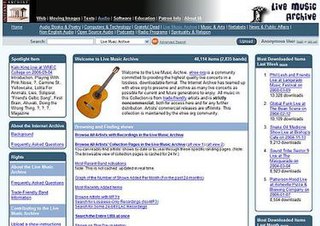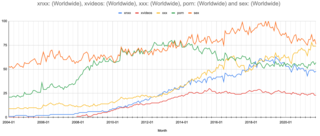Internet Underground Music Archive
Last updatedThe Internet Underground Music Archive (IUMA) was an organization that provided a venue for unsigned artists to share their music and communicate with their audience. IUMA is widely recognized as the birthplace of online music. IUMA's goal was to help independent artists use the Internet to distribute their music to fans while circumventing the usual distribution model of using a record company. [1] IUMA was started by Rob Lord, Jeff Patterson and Jon Luini from the University of California, Santa Cruz in 1993. [2]
IUMA originally existed as FTP and Gopher sites, before the World Wide Web was widely used. On March 9, 1994 CNN featured IUMA in their "Showbiz News" segment. [3] In June 1999, IUMA was purchased by EMusic, and moved operations from Santa Cruz to Redwood City, home of the EMusic offices. IUMA provided artists who registered with a free URL and web page. The artists could present their music over the Internet in stream, download, and internet radio format. Further, it provided an easy-to-use home page for the band and the ability to distribute their music with no bandwidth fees. Some of the original file formats used to encode the music were WAV, AIFF and MP2. MP3 was added later as that format became more popular.
In 2000, IUMA offered US$5,000 to couples who named their baby "Iuma". Several families took up the offer. [4] IUMA flourished, hosting events such as "Music-o-mania", the largest online "Battle of the Bands" ever held. The winners were given rock star treatment, flown to San Francisco to open for Primus at the Fillmore auditorium.
Early in 2006, the IUMA website disappeared from the Internet. The site had already been closed to new submissions since 2001, when EMusic downsized, eliminating most of the IUMA staff. [5] Despite this setback, much of IUMA's core group continued to work on a "volunteer" basis, in the hopes that IUMA could be resurrected. IUMA was subsequently purchased in 2002 by Vitaminic, an Italian music company. [6]
In late May 2012, Jason Scott Sadofsky (founder of Textfiles.com) announced that much of IUMA's collection has been reposted via the Internet Archive. John Gilmore, co-founder of the Electronic Frontier Foundation (EFF), managed to retrieve the surviving files before its shutdown. [7]
Notes
- ↑ Maurer, Wendy. "THE DYNAMICS OF MUSIC DISTRIBUTION". Archived from the original on April 29, 2008. Retrieved April 21, 2008.
- ↑ David Pescovitz (August 30, 1995). "It's All Geek to Them; Digital Communes Find a Social Scene in Computers". Business section, The Cutting Edge: COMPUTING / TECHNOLOGY / INNOVATION. Los Angeles Times. p. 1. Archived from the original on July 25, 2012. Retrieved April 21, 2008.
...27-year-old Jon Luini, who co-founded the hip Internet Underground Music Archive (IUMA) in 1993
Alt URL - ↑ Boucher, Robert. "IUMA on CNN (3/9/1994)". YouTube . Retrieved April 29, 2008.
- ↑ "It's a boy.com! (article on Iuma Dylan-Lucas Thornhill)". BBC. August 17, 2000. Retrieved September 28, 2006.
- ↑ "IUMA ceases operations". CD Baby. February 7, 2001. Archived from the original on May 31, 2009. Retrieved June 28, 2006.
- ↑ "Digital music provider buys IUMA". CNET. January 2, 2002. Retrieved April 21, 2023.
- ↑ Roettgers, Janko (May 29, 2012). "The Internet Underground Music Archive is back". GigaOM . Retrieved May 30, 2012.
External links
- Contents of the IUMA site mirrored at archive.org
- IUMA web site archived at archive.org
- Blog post on the resurrection of IUMA
- Interview with Jon Luini on the life and death of IUMA
Related Research Articles

Streaming media is multimedia that is delivered and consumed in a continuous manner from a source, with little or no intermediate storage in network elements. Streaming refers to the delivery method of content, rather than the content itself.

Warez is a common computing and broader cultural term referring to pirated software that is distributed via the Internet. Warez is used most commonly as a noun, a plural form of ware, and is intended to be pronounced like the word wares. The circumvention of copy protection (cracking) is an essential step in generating warez, and based on this common mechanism, the software-focused definition has been extended to include other copyright-protected materials, including movies and games. The global array of warez groups has been referred to as "The Scene", deriving from its earlier description as "the warez scene". Distribution and trade of copyrighted works without payment of fees or royalties generally violates national and international copyright laws and agreements. The term warez covers supported as well as unsupported (abandonware) items, and legal prohibitions governing creation and distribution of warez cover both profit-driven and "enthusiast" generators and distributors of such items.

A digital music store is a business that sells digital audio files of music recordings over the Internet. Customers gain ownership of a license to use the files, in contrast to a music streaming service, where they listen to recordings without gaining ownership. Customers pay either for each recording or on a subscription basis. Online music stores generally also offer partial streaming previews of songs, with some songs even available for full length listening. They typically show a picture of the album art or of the performer or band for each song. Some online music stores also sell recorded speech files, such as podcasts, and video files of movies.
MP3.com is a web site operated by CNET Networks publishing tabloid-style news items about digital music and artists, songs, services, and technologies. It is better known for its original incarnation as a legal, free music-sharing service, named after the popular music file format MP3, popular with independent musicians for promoting their work. That service was shut down on December 2, 2003, by CNET, which, after purchasing the domain name, established the current MP3.com site.
A netlabel is a record label that distributes its music through digital audio formats over the Internet. While similar to traditional record labels in many respects, netlabels typically emphasize free distribution online, often under licenses that encourage works to be shared, and artists often retain copyright.

eMusic is an online music and audiobook store that operates by subscription. In exchange for a monthly subscription eMusic users can download a fixed number of MP3 tracks per month. eMusic was established in 1998, is headquartered in New York City with an office in London, and is owned by TriPlay.

Adobe Flash animation is an animation that is created with the Adobe Animate platform or similar animation software and often distributed in the SWF file format. The term Adobe Flash animation refers to both the file format and the medium in which the animation is produced. Adobe Flash animation has enjoyed mainstream popularity since the mid-2000s, with many Adobe Flash-animated television series, television commercials, and award-winning online shorts being produced since then.
Internet video is digital video that is distributed over the internet. Internet video exists in several formats, the most notable being MPEG-4i AVC, AVCHD, FLV, and MP4.
The online service imeem was a social media website where users interacted with each other by streaming, uploading and sharing music and music videos. It operated from 2003 until 2009 when it was shut down after being acquired by MySpace.

The Live Music Archive (LMA), part of the Internet Archive, is an ad-free collection of over 170,000 concert recordings in lossless audio formats. The songs are also downloadable or playable in lossy formats such as Ogg Vorbis or MP3. The website is known for its extensive collection of Grateful Dead recordings, and contains music from many other bands.
Internet Citizen's Band is an early Internet chat program and its associated protocol. It was released in 1989.
Amazon Music is a music streaming platform and online music store operated by Amazon. As of January 2020, the service had 55 million subscribers.
Deth Specula is a Santa Cruz "neo-bronto" five-piece rock band. Deth Specula was one of the first ten bands on The Internet Underground Music Archive and used the Internet to broadcast a live music concert from the Cowell Courtyard at the SCO Forum held on the University of California in Santa Cruz on August 23, 1994. This was the first time a live music concert was broadcast over the Internet and the second netcast ever. The first song ever broadcast in a live concert over the Internet was "Internet Band", a Deth Specula parody of the Grand Funk Railroad song "We're An American Band".
Addicted to Noise (ATN) was an online music magazine in the early days of the World Wide Web. Founded in 1994 by ex-Rolling Stone associate editor and senior writer Michael Goldberg and online music pioneer Jon Luini, it published its first issue in December 1994 and was the first online magazine to include audio samples alongside new album reviews.
In the first decade of the 21st century, the rise of digital media on the internet and computers as a central and primary means to record, distribute, store, and play music caused widespread economic changes in the music industry. The rise of digital media with high-speed internet access fundamentally changed the relationships between artists, record companies, promoters, retail music stores, the technology industry, and consumers. The rise of digital music consumption options contributed to several fundamental changes in consumption. One significant change in the music industry was the remarkable decline of conventional album sales on CD and vinyl. With the à la carte sales models increasing in popularity, consumers no longer downloaded entire albums but rather chose single songs.

Internet pornography is any pornography that is accessible over the internet; primarily via websites, FTP connections, peer-to-peer file sharing, or Usenet newsgroups. The greater accessibility of the World Wide Web from the late 1990s led to an incremental growth of internet pornography, the use of which among adolescents and adults has since become increasingly popular.

Elizabeth Jocelyn "Jake" Feinler is an American information scientist. From 1972 until 1989 she was director of the Network Information Systems Center at the Stanford Research Institute. Her group operated the Network Information Center (NIC) for the ARPANET as it evolved into the Defense Data Network (DDN) and the Internet.

ONErpm is a digital distribution service and fan engagement platform founded in 2010 by Emmanuel Zunz and Matthew Olim, the latter one of the co-founders of CDNow, a pioneer in digital music. The company offers such services as direct-to-fan sales, distribution to multiple web outlets including iTunes, Spotify, Amazon MP3, Rdio, Google Music, Deezer, eMusic, YouTube, music sharing widgets and an app that allows artist to stream and sell music on Facebook
An online video platform (OVP), provided by a video hosting service, enables users to upload, convert, store and play back video content on the Internet, often via a private server structured, large-scale system that may generate revenue. Users will generally upload video content via the hosting service's website, mobile or desktop application, or other interfaces (API). An example of an OVP is YouTube. The type of video content uploaded might be anything from shorts to full-length TV shows and movies. The video host stores the video on its server and offers users the ability to enable different types of embed codes or links that allow others to view the video content. The website, mainly used as the video hosting website, is usually called the video-sharing website.
Text is available under the CC BY-SA 4.0 license; additional terms may apply.
Images, videos and audio are available under their respective licenses.